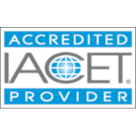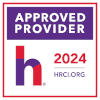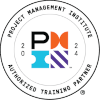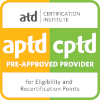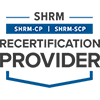Certificate Suite Details
Key Features
- Mobile-friendly
- Audio-enabled
- Badge and credit-awarding
- Video content
- Fully accessible
- Games & Flashcards
- Expert-supported
- Real-world case studies
Certificate Preview
Certificate Description
Learner Feedback
Courses Included in this Certificate
Course Description
Using SMART goals is widely considered a best practice for setting targets and measuring employee progress. SMART goals are goals that include the valuable details that help make them attainable. They provide employees with a sense of direction, keep them motivated, and let them know how and when their progress will be evaluated.
In this course, we describe the five characteristics of SMART goals: specific, measurable, attainable, relevant, and time-bound. You will learn to recognize whether or not a goal is SMART and to outline the process for developing effective SMART goals. Finally, you'll learn how SMART goals can be evaluated and how they can be used to create an action plan that helps employees set and meet their unique targets.
Course Credits
Course Description
In this course, you will explore the various types of HR communications and communication channels, study the elements of effective communication, and consider strategies for building your communication skills. You will also learn how to write and communicate clearly and with purpose, consider how to tailor your messages for defined audiences, and discover how to facilitate open communication. As an HR professional, your job is to develop and maintain an effective work team that upholds the company's policies and positions. Communication is essential to accomplishing your goals, preventing misunderstandings, and encouraging productivity.
Course Credits
Course Description
The goal of coaching in a business environment is to help an employee to grow, develop, and succeed by removing roadblocks to performance and enhancing creativity. Coaching is a skill that can be learned with practice and one that will pay back in improved employee performance and workplace culture.
In this course you will explore how coaching employees is a vital part of management in any organization. We'll discuss the differences between coaching and mentoring, identify common coaching challenges, review the GROW model, explain the importance of active listening and setting SMART goals, and discuss how to monitor progress and provide feedback.
Course Credits
Course Description
HR professionals perform a wide variety of tasks within an organization. However, regardless of their role or function area, all HR managers at some point have to engage in difficult conversations. While these conversations are not easy to have, there are ways to make them less difficult.
In this course, we will define difficult conversations as those involving sensitive or contentious matters that often trigger strong emotions that can prove challenging to handle for the participants. We'll discuss how preparing for these conversations, focusing on employee behavior, engaging in active listening, and encouraging back-and-forth discussion can make them more productive. Armed with the right tools and techniques, you can handle difficult conversations and steer them to a successful conclusion.
Course Credits
Course Description
Progressive discipline is a best practice for handling workplace issues by providing opportunities for employees to correct problems through a series of increasingly severe sanctions. This course will provide HR professionals with the skills necessary to implement and manage an effective progressive discipline program at their organization.
Course Credits
Course Description
The Human Resources department of an organization manages its people, which makes it key to organization success. This course will address the leadership aspects of HR: devising and implementing strategic planning and upholding an organization's core values, developing talent and future leaders within the organization, recruiting and maintaining a diverse workforce, creating an inclusive environment, and being ready to handle crises. The course will offer HR professionals strategies and best practices for implementing these important leadership functions.
Course Credits
Course Description
Every organization encounters the occasional conflict. When dealt with effectively, it can make an organization stronger and more resilient. When left unchecked, it can affect the well-being of employees and the success of an organization. This course provides an overview of the benefits of conflict resolution. We discuss the role of HR in handling disputes and describe some common sources of workplace conflict. You will learn to identify different conflict styles along with strategies and best practices for responding to workplace conflict. We also discuss how to identify and respond to dangerous situations. Finally, you'll learn about organizational policies and legal considerations for handling conflict.
Course Credits
Course Description
In this course, you will learn a number of techniques and models for problem solving. You will also learn about the types of problems HR professionals encounter. Lastly, you will apply problem-solving strategies to a number of real-world HR issues. Through practice, you will hone your problem-solving skill set and become a more effective HR professional.
Course Credits
Notes
This course has an "Ask the Expert" feature, which submits your questions directly to an expert in the field you are studying. Questions are answered as quickly as possible and usually within 24 hours.
As an Accredited Provider, MindEdge offers for its learning events that comply with the Continuing Education and Training Standard.
Learners must achieve an average test score of at least 70% to meet the minimum successful completion requirement and qualify to receive credit. Learners will have three attempts at all graded assessments.
Project Management Institute, , the Registered Education Provider logo, Project Management Professional, , Project Management Body of Knowledge, , Agile Certified Practitioner, -, Risk Management Professional, -, the Talent Triangle, and the Talent Triangle logo are marks of the Project Management Institute, Inc.
Information in this course has been taken from A Guide to the Project Management Body of Knowledge, (® Guide) - Sixth Edition, Project Management Institute Inc., 2017.
The following list outlines the you will earn for completing this course, based on the certifications you have.
